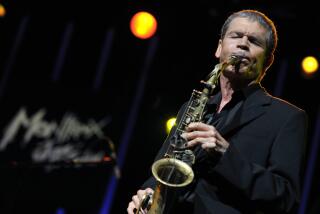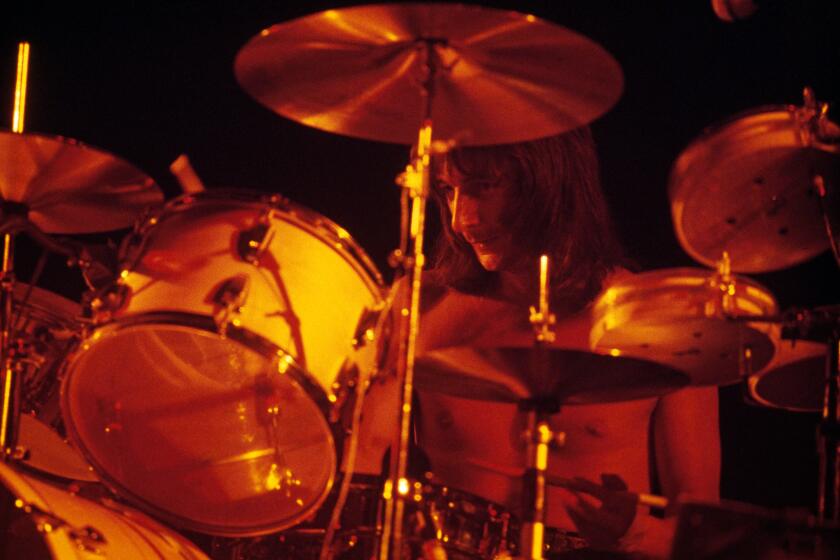HE’S HOPING TO CASH IN ON ELVIS’ LAST CONCERTS
You can buy copies in any video store of Elvis Presley’s old movies or his 1968 NBC-TV special or his 1973 Hawaii concert.
But the only way to obtain a video of Elvis’ final two live performances is through Wade Williams, a Sepulveda audio engineer.
For the record:
12:00 a.m. May 28, 1986 FOR THE RECORD
Los Angeles Times Wednesday May 28, 1986 Home Edition Calendar Part 6 Page 4 Column 1 Entertainment Desk 2 inches; 63 words Type of Material: Correction
The Elvis Presley video tapes that Sepulveda audio engineer Wade Williams is trying to sell for $500,000 were not made at Presley’s “final concerts,” as reported Tuesday in Calendar. Instead, the shows in Omaha, Neb., and Rapid City, S.D., were the last Presley performances officially videotaped. Presley actually played five more cities after Rapid City, S.D., on that June, 1977, tour. His final performance was in Indianapolis, Ind., on June 26.
Supply, however, is limited: Williams has just one copy.
And the asking price is high: $500,000.
How does a Sepulveda man have the only copy of the concerts--aside from what’s in the Presley Estate vaults?
It’s a classic case of being in the right place at the right time.
Presley’s last two concerts--Omaha, Neb., and Rapid City, S.D., in June, 1977--were taped for a CBS-TV special and Williams supplied the mobile recording truck used to record the sound. He kept a souvenir copy of the video footage that was piped into the truck for the sound engineer to see what was happening on stage.
Only a few minutes of the concert footage was included in the October, 1977, special because Presley’s performance and appearance had been so “disappointing.” The rest of the hour was filled in with fan interviews and backstage preparations.
The Presley Estate owns the original color tapes from those concerts--and its merchandising representative says there are no plans at present to make them public.
That leaves Williams, 44, with the only other copy--more than 4 1/2 hours of black-and-white footage. And Williams says he must sell the tapes to pay debts that have piled up following a series of heart attacks.
Williams and his wife, Holly, thought of holding a raffle so, he said, “the rich and poor could both have a chance to own this piece of history. We even thought of giving part of the proceeds to Nancy Reagan’s anti-drug campaign if the President would draw the winning ticket.”
But the Presley Estate has forbidden him from doing anything more than selling his copy to another private party.
So, Williams, represented by the Tyler Kjar Agency in Los Angeles, is looking for a buyer.
“We will sign an affidavit that this is the only copy of the tape,” Williams said, sitting in the workroom of his two-story house. “We will also give the buyer the half-inch video recorder that we used to record the tape . . . and backstage passes and other memorabilia from the shows.
“The only thing I’m keeping is a belt buckle that . . . Elvis wanted me to have.”
There have been so many movies and plays about Presley that it was hard to know when the black-and-white images first came on the Williams’ TV screen if the man in the dressing room were really the King of Rock ‘n’ Roll or simply another actor.
In a way, you hoped that it was an actor. This wasn’t the slim, charismatic Elvis that fans like to remember. Badly out of shape and a dazed look in his eyes, Presley looked frightfully unhealthy.
Moments later, he stepped on stage and flashbulbs brightened the otherwise darkened arena like a fireworks show. Elvis accepted a rose from a fan who rushed to the edge of the stage. He then strapped on a guitar and began singing.
Williams, who had worked on numerous TV, recording and movie projects as an audio engineer in Los Angeles and New York, was based in Denver in 1977 when contacted by producers Dwight Hemion and Gary Smith, who were doing the CBS special. They needed his mobile recording truck.
So Williams drove the truck, with its 24-track recording studio, to Omaha, where engineer Doug Nelson oversaw the actual recording.
“The customary thing in a remote situation is to have a (television monitor) in the truck so you can see what is going on out on stage,” Williams said. “It is like a control window. If you didn’t have that, you’d be mixing (the sound) in the blind.”
On jobs like this, Williams usually made a copy of the video feed as a souvenir. In this case, he netted about 2 1/2 hours of Elvis on stage and another half hour of him backstage, he said. The rest of the footage is of the opening acts and stage preparations.
Back in Denver, Williams put the rolls of half-inch, reel-to-reel video tapes on the shelf along with rolls from past TV tapings. But the value of the Presley tapes changed dramatically on Aug. 16, 1977.
Williams recalled, “The day after Elvis died, we put the tapes in a vault.”
Williams was more a fan of ballad singers like Frank Sinatra and Johnny Mathis than Presley. “The first time I saw Elvis on the Ed Sullivan TV show, we just sat and laughed,” he said. “It was like, ‘Look at this guy . . . he’s crazy.’ ”
But he remembers the excitement of the 1977 project. “It was . . . like a buzz of electricity in the air,” Williams said. “When you watch the tapes (now) and see him singing and you know that he died six weeks later, it’s like there is a message in the songs. . . . When he sings, ‘The end is near’ (in “My Way”), it’s like he was telling the audience something.”
Williams, who said he has been unable to work after a series of heart attacks, has been selling numerous personal effects to pay debts. He and his wife finally decided to put the tapes on the market and, working with television producer and personal manager Rudy Tellez, contacted the Presley Estate about the possibility of releasing the final concert as a commercial home video.
But Tellez, in meetings with Presley Estate representative Joe Rascoff, learned that the only thing the estate would allow was for the Williamses to sell their personal copy--as long as the buyer realized it couldn’t be used for television or video purposes.
“Our feeling is that they (the estate) want Elvis remembered the way he was in the ‘50s and ‘60s--and not at the end of his life,” Holly Williams said. “But we talked to several collectors who tell us the fans are tired of the ‘50s and ‘60s . . . they want to see his last show.
“I’d like to see some wealthy donor buy the tapes and then give them to some public archives like the one at USC, but it’s really out of our hands. We’re at a point where we need the money . . . so we can’t dictate who buys the tapes.”
More to Read
The biggest entertainment stories
Get our big stories about Hollywood, film, television, music, arts, culture and more right in your inbox as soon as they publish.
You may occasionally receive promotional content from the Los Angeles Times.






